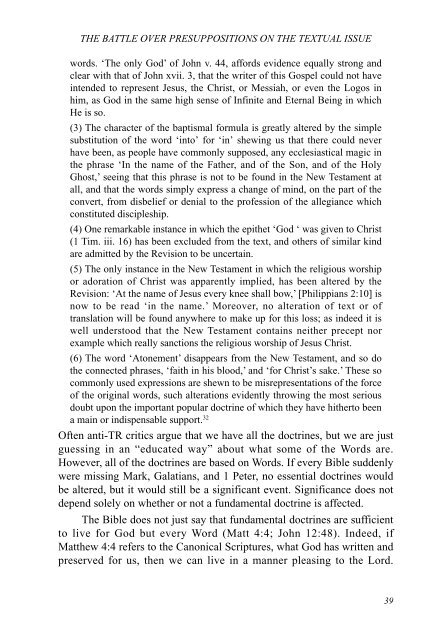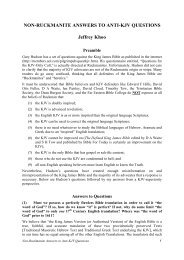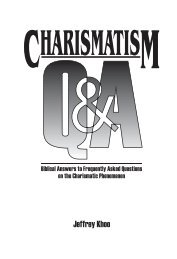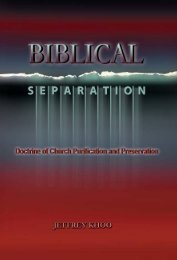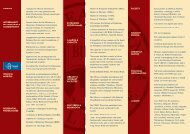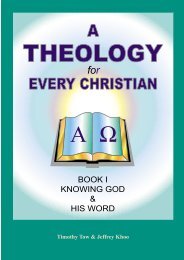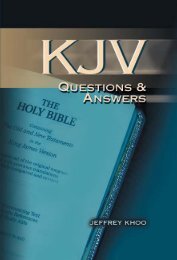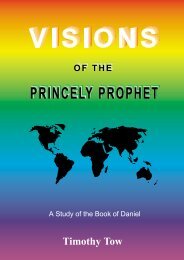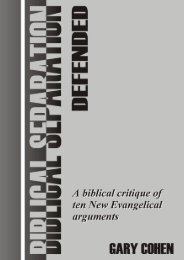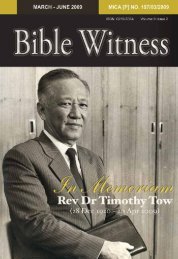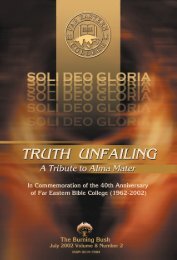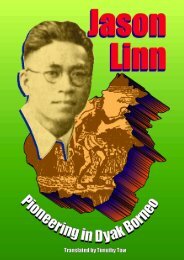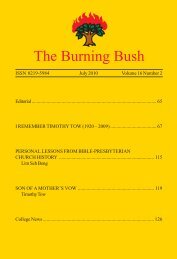The Burning Bush - Far Eastern Bible College
The Burning Bush - Far Eastern Bible College
The Burning Bush - Far Eastern Bible College
You also want an ePaper? Increase the reach of your titles
YUMPU automatically turns print PDFs into web optimized ePapers that Google loves.
THE BATTLE OVER PRESUPPOSITIONS ON THE TEXTUAL ISSUEwords. ‘<strong>The</strong> only God’ of John v. 44, affords evidence equally strong andclear with that of John xvii. 3, that the writer of this Gospel could not haveintended to represent Jesus, the Christ, or Messiah, or even the Logos inhim, as God in the same high sense of Infinite and Eternal Being in whichHe is so.(3) <strong>The</strong> character of the baptismal formula is greatly altered by the simplesubstitution of the word ‘into’ for ‘in’ shewing us that there could neverhave been, as people have commonly supposed, any ecclesiastical magic inthe phrase ‘In the name of the Father, and of the Son, and of the HolyGhost,’ seeing that this phrase is not to be found in the New Testament atall, and that the words simply express a change of mind, on the part of theconvert, from disbelief or denial to the profession of the allegiance whichconstituted discipleship.(4) One remarkable instance in which the epithet ‘God ‘ was given to Christ(1 Tim. iii. 16) has been excluded from the text, and others of similar kindare admitted by the Revision to be uncertain.(5) <strong>The</strong> only instance in the New Testament in which the religious worshipor adoration of Christ was apparently implied, has been altered by theRevision: ‘At the name of Jesus every knee shall bow,’ [Philippians 2:10] isnow to be read ‘in the name.’ Moreover, no alteration of text or oftranslation will be found anywhere to make up for this loss; as indeed it iswell understood that the New Testament contains neither precept norexample which really sanctions the religious worship of Jesus Christ.(6) <strong>The</strong> word ‘Atonement’ disappears from the New Testament, and so dothe connected phrases, ‘faith in his blood,’ and ‘for Christ’s sake.’ <strong>The</strong>se socommonly used expressions are shewn to be misrepresentations of the forceof the original words, such alterations evidently throwing the most seriousdoubt upon the important popular doctrine of which they have hitherto beena main or indispensable support. 32Often anti-TR critics argue that we have all the doctrines, but we are justguessing in an “educated way” about what some of the Words are.However, all of the doctrines are based on Words. If every <strong>Bible</strong> suddenlywere missing Mark, Galatians, and 1 Peter, no essential doctrines wouldbe altered, but it would still be a significant event. Significance does notdepend solely on whether or not a fundamental doctrine is affected.<strong>The</strong> <strong>Bible</strong> does not just say that fundamental doctrines are sufficientto live for God but every Word (Matt 4:4; John 12:48). Indeed, ifMatthew 4:4 refers to the Canonical Scriptures, what God has written andpreserved for us, then we can live in a manner pleasing to the Lord.39


